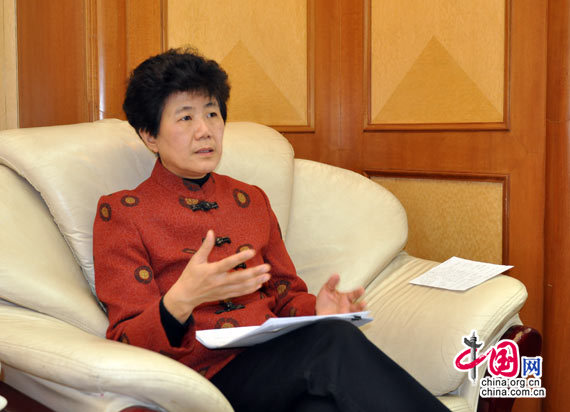Expert: Why China vetoed UN draft on Syria
- By Zhou Jing
 0 Comment(s)
0 Comment(s) Print
Print E-mail China.org.cn, February 22, 2012
E-mail China.org.cn, February 22, 2012
Vice President of the United Nations Association of China, Zhang Xiao'an, explained Monday why China voted against a draft resolution at the United Nations General Assembly on Feb. 16 that endorsed the Arab League plan for the Syrian president to step down.
 |
|
Vice President of the United Nations Association of China, Zhang Xiao'an, speaks in an exclusive interview with China.org.cn on February 20, 2012. [Zhou Jing/China.org.cn] |
In an exclusive interview with China.org.cn, Zhang said that China advocates a peaceful resolution of the regional conflict and resolutely opposes the use of force. She stressed that this has been China's consistent stance with regard to foreign affairs and is equally applicable to the Syrian issue.
The draft implied so-called "regime change" through means of force in Syria, specifically demanding that Syrian President Bashar al-Assad hand over power, she said. "That was a problem as it obviously violated the UN Charter's principle of non-interference."
Zhang added that the government of a country should be decided by its people rather than the UN or a foreign power.
She explained that, rather than requiring all parties, especially opposition forces, to cease their acts of violence, the draft only demanded the cessation of violence on the part of the Syrian government. She pointed out that both sides should be required to refrain from further violence, and that certain factions of the Syrian opposition force, including the Free Syrian Army, and even al-Qaeda, were responsible for carrying out acts of violence and terrorism.
"If we do not stop the violence from both sides, the situation will, in all likelihood, escalate," she said. "As far as the UN is concerned, it is unfair to demand that only one side stop the violence."
"China hopes that all parties will forego violence and instead engage in dialogue so that the Syrian crisis can be peacefully resolved."
Zhang, who has worked at the UN for eight years, explained that according to her experience, the many discussions each year on various UN drafts inevitably result in a wide range of, often divergent, views, with each of the 193 member states making their decisions based on national interests. She stressed that, under such circumstances, a spirit of cooperation and compromise is crucial at the UN.
She added that all the parties should adopt a constructive attitude in order to downplay or eliminate differences through negotiations and compromise.
She stated that Western countries had, as soon as the draft resolution on Syria was proposed, "opposed any calls for discussions to address the differing views [within the UN] and refused to accept any amendment, demanding instead a forced vote on the draft."
Commenting on these actions, she said: "They do not demonstrate the spirit of cooperation through which the [Syria] question can be settled and they are at variance with regular UN protocols." She added that such actions had merely exacerbated and further complicated the situation. "This is one of the main reasons why China voted against the draft," she said.
Syria, located in the center of the Arab-Islamic area in Western Asia, has been plagued by an 11-month-long political crisis. The UN General Assembly on Feb. 16 adopted a draft resolution supporting the political transition in Syria with a vote of 137-12 with 17 abstentions.






Go to Forum >>0 Comment(s)